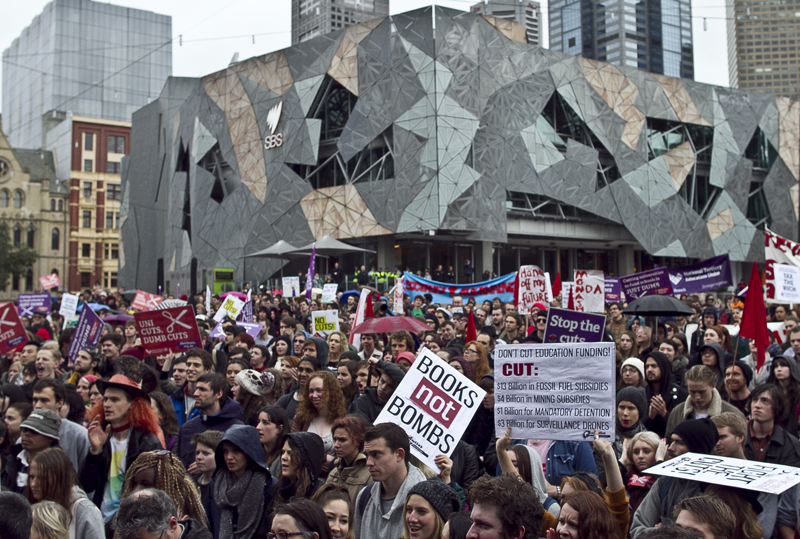New protest laws passed by the Victorian upper house on Tuesday could impact the right of university students to peacefully protest.
The changes to the Summary Offences Act 1996 give police greater powers to order protesters to “move on”, and those who do not obey these orders could face a $720 fine or jail time.
The Summary Offences and Sentencing Amendment Bill 2013, which passed with a vote of 20-18, gives new grounds for police to “move on” individuals for reasons including a fear of violence, obstructing other people or traffic and blocking entry to a premise.
It is the first time prison sentences have been associated with move on powers, Maurice Blackburn Lawyers associate Lizzie O’Shea, says.
“It gives police greater powers,” O’Shea said. “Ultimately, if enough move on orders are issued, you could face a jail sentence for breaching them.”
The “move on” laws previously excluded protests, but direct action will no longer have this protection.The new laws will come into effect on 1 September.
The legislative changes address the ongoing picket protest preventing drilling on the East-West Tunnel in inner-Melbourne, but there are also concerns they will be used to break up other forms of public demonstration.
The laws could also be used to prevent peaceful protesting by university students, according to National Tertiary Education Union delegate Liam Ward.
“They’re atrocious,” said Ward. “They essentially remove the right to protest. They’re an absolute attack on civil liberties and should be resisted down the line. They’re clearly targeted at cracking down on protests in Melbourne.”
Ward also points out that protests at RMIT could be impacted by the law changes.
“Protesting around RMIT would be in a situation where people involved could potentially find themselves being arrested without ever having heard a request from a police officer to move on,” he said.
Last year saw multiple protests at RMIT’s city campus following cuts to tertiary education, including a demonstration in May where around 1000 students and academics rallied—bringing traffic to a standstill as they marched down Swanston Street.
O’Shea also says the laws are “troubling” for university protests.
“The bottom line is there’s less protection for that kind of protest than there was previously,” she said. “It’s pretty troubling for anyone who has an interest in the right to freedom of association and the right to protest, which I think are bedrocks of our democratic system.”
More protests are required to combat the changes, NTEU delegate Liam Ward says.
“I think the way to defeat these laws and maintain our right to protest is to do exactly what we did to win those rights in the first place, which is protesting for the right to protest,” he said. “The point of the laws is to make people scared, to make people think ‘even though I care deeply about an issue, I don’t want to go to the protest because I don’t want to be arrested’. The only way to ensure that we can protect our right to protest is to defy that, and say we’re going to protest, we’re not scared.”
By Denham Sadler
Photograph by Alan Weedon


